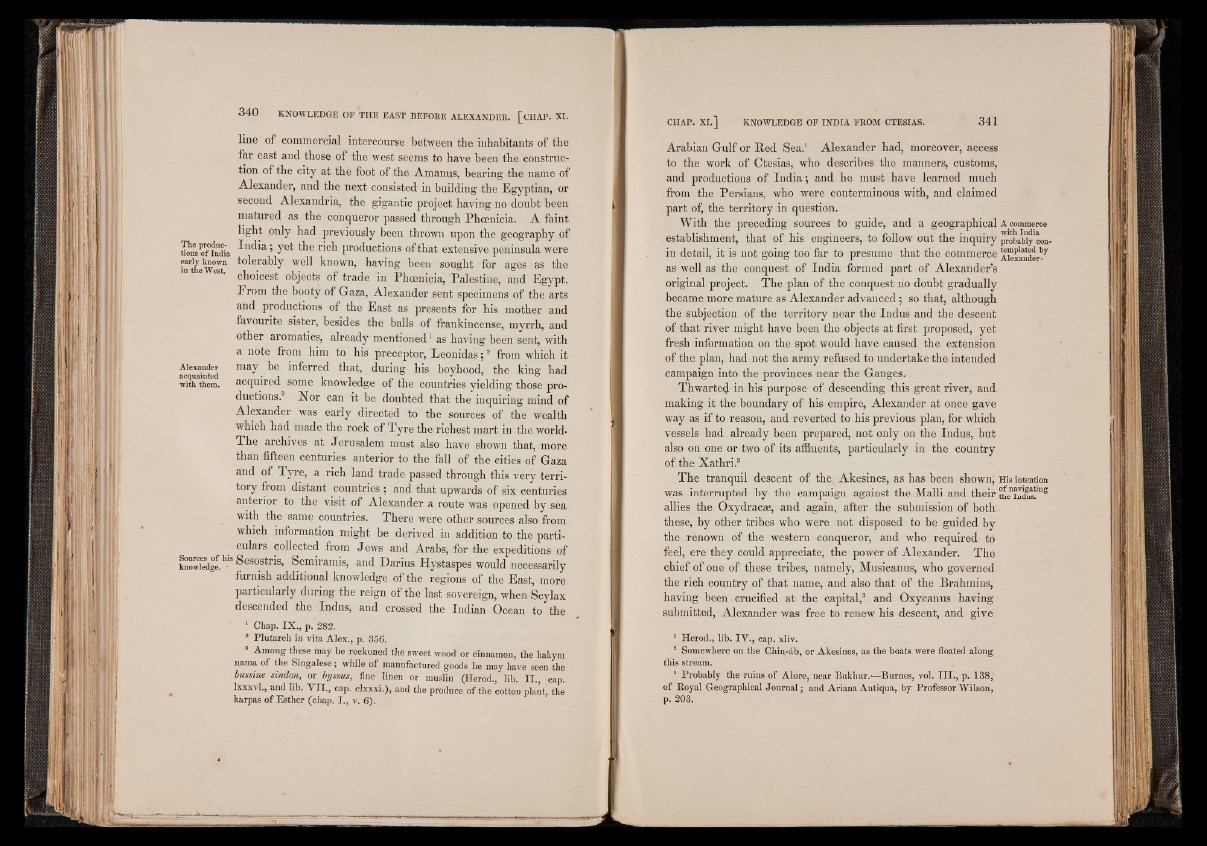
line of commercial intercourse between the inhabitants of the
far east and those of the west seems to have been the construction
of the city at the foot of the Amanus, bearing the name of
Alexander, and the next consisted in building the Egyptian, or
second Alexandria, the gigantic project having no doubt been
matured as the conqueror passed through Phoenicia. A faint
light only had previously been thrown upon the geography of
^nc^a 5 yet rï*e rich productions of that extensive peninsula were
early known tolerably well known, having been sought for ages as the in the West. i • i • n o o choicest objects of trade in Phoenicia, Palestine, and Egypt.
Erom the booty of Gaza, Alexander sent specimens of the arts
and productions of the East as presents for his mother and
favourite sister, besides the balls of frankincense, myrrh, and
other aromatics, already mentioned1 as having been sent, with
a note from him to his preceptor, Leonidas ; 2 from which it
Alexander may be inferred that, during his boyhood, the king had acquainted j -, , , _ , \ 7 o
with them, acquired some knowledge of the countries yielding those productions.
Nor can it be doubted that the inquiring mind of
Alexander was early directed to the sources of the wealth
which had made the rock of Tyre the richest mart in the world-
The archives at Jerusalem must also have shown that, more
than fifteen centuries anterior to the fall of the cities of Gaza
and of Tyre, a rich land trade passed through this very territory
from distant countries ; and that upwards of six centuries
anterior to the visit of Alexander a route was opened by sea
with the same countries. There were other sources also from
which information might be derived in addition to the particulars
collected from Jews and Arabs, for the expeditions of
knowledge.k-'S 'S®sostris, Semiramis, and Darius Hystaspes would necessarily
furnish additional knowledge of the regions of the East, more
particularly during the reign of the last sovereign, when Scylax
descended the Indus, and crossed the Indian Ocean to the
1 Chap. IX ., p. 282.
8 Plutarch in vita Alex., p. 356.
8 Among these may be reckoned the sweet wood or cinnamon, the hakym
nama of the Singalese ; while of manufactured goods he may have seen the
bvssine sindon, or byssus, fine linen or muslin (Herod., lib. I I ., cap.
lxxxvi., and lib. V I I ., cap. clxxxi.), and the produce of the cotton plant, the
karpas of Esther (chap. I., v. 6).
Arabian Gulf or Red Sea.1 Alexander had, moreover, access
to the work of Ctesias, who describes the manners, customs,
and productions of India; and he must have learned much
from the Persians, who were conterminous with, and claimed
part of, the territory in question.
With the preceding sources to guide, and a geographical A commerce
establishment, that of his engineers, to follow out the inquiry probabiy con-
in detail, it is not going too far to presume that the commerce A™xander?y
as well as the conquest of India formed part of Alexander’s
original project. The plan of the conquest no doubt gradually
became more mature as Alexander advanced; so that, although
the subjection of the territory near the Indus and the descent
of that river might have been the objects at first proposed, yet
fresh information on the spot would have caused the extension
of the plan, had not the army refused to undertake the intended
campaign into the provinces near the Ganges.
Thwarted in his purpose of descending this great river, and
making it the boundary of his empire, Alexander at once gave
way as if to reason, and reverted to his previous plan, for which
vessels had already been prepared, not only on the Indus, but
also on one or two of its affluents, particularly in the country
of the Xathri.2
The tranquil descent of the Akesines, as has been shown; His intention
was interrupted by the campaign against the Malli and their Hindus!’118
allies the Oxydracse, and again, after the submission of both
these, by other tribes who were not disposed to be guided by
the renown of the western conqueror, and who required to
feel, ere they could appreciate, the power of Alexander. The
chief of one of these tribes, namely, Musicanus, who governed
the rich country of that name, and also that of the Brahmins,
having been crucified at the capital,3 and Oxycanus having
submitted, Alexander was free to renew his descent, and give
1 Herod., lib. IV ., cap. xliv.
8 Somewhere on the Chin-db, or Akesines, as the boats were floated along
this stream.
s Probably the ruins of Alore, near Bukhur.—Burnes, vol. I I I ., p. 138,
of Royal Geographical Jo u rn a l; and Ariana Antiqua, by Professor Wilson,
p. 203.